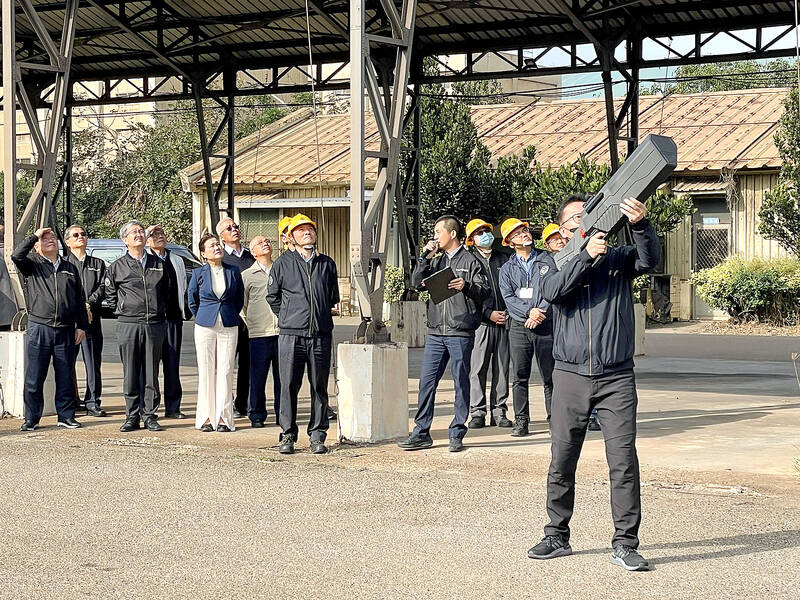The Cabinet is planning to purchase drone jamming guns and set up a “passive radar detection and response system” to deter sabotage and enemy attacks as part of a two-tier defense scheme involving Taiwan Power Co (Taipower, 台電) and CPC Corp, Taiwan (CPC, 台灣中油), a Ministry of Economic Affairs official said during a press event on Saturday.
Taipower and CPC Corp facilities, including nuclear energy plants operated by the former, are listed as Category 1 critical infrastructure, a Cabinet official said, adding that in the wake of China’s incursions into Taiwan’s air defense identification zone, these facilities need enhanced protection.
As Russia’s invasion of Ukraine showed, drones are used by both sides in fighting scenarios to attack and destroy critical infrastructure, therefore the ministry this year approved drone jamming gun procurement, the ministry official said.

Photo courtesy of Taiwan Power Co
Taipower this year approved a more than NT$10 million (US$319,438) budget for the acquisition of the first batch of 60 drone jamming guns, the official said, adding that one to two guns are to be distributed to each Taipower plant and the second batch procurement would be made before next year.
The ministry is also to set up a “passive radar detection and response system” around Taipower and CPC Corp facilities, they said.
The system is already in place for Taiwan Taoyuan International Airport, a Taipower official said, adding that it detects unknown flying objects or aircraft a few kilometers away from a power plant or a major electricity grid and tracks the object to find its path.
Each unit is expected to cost about NT$10 million, the Taipower official said.
Lacking any drone jamming guns, the Taichung Power Plant is working with the city’s police department to establish surveillance stations integrated into the “intelligence-gathering system” at the Taichung Harbor, which is linked up with a local security protection network, the ministry official said.
The Taichung Power Plant is located near Taichung Harbor, which is off-limits to drones, the official said, adding that commercial drones using GPS would be rendered useless when intruding into such an off-limits zone.
However, non-commercial drones are difficult to inspect, which is why drone jamming guns are needed for critical infrastructure’s security, they said, adding that it might later be discussed whether critical Taipower and CPC Corp facilities need to be designated as “no drone zones.”

People can preregister to receive their NT$10,000 (US$325) cash distributed from the central government on Nov. 5 after President William Lai (賴清德) yesterday signed the Special Budget for Strengthening Economic, Social and National Security Resilience, the Executive Yuan told a news conference last night. The special budget, passed by the Legislative Yuan on Friday last week with a cash handout budget of NT$236 billion, was officially submitted to the Executive Yuan and the Presidential Office yesterday afternoon. People can register through the official Web site at https://10000.gov.tw to have the funds deposited into their bank accounts, withdraw the funds at automated teller

PEACE AND STABILITY: Maintaining the cross-strait ‘status quo’ has long been the government’s position, the Ministry of Foreign Affairs said Taiwan is committed to maintaining the cross-strait “status quo” and seeks no escalation of tensions, the Ministry of Foreign Affairs (MOFA) said yesterday, rebutting a Time magazine opinion piece that described President William Lai (賴清德) as a “reckless leader.” The article, titled “The US Must Beware of Taiwan’s Reckless Leader,” was written by Lyle Goldstein, director of the Asia Program at the Washington-based Defense Priorities think tank. Goldstein wrote that Taiwan is “the world’s most dangerous flashpoint” amid ongoing conflicts in the Middle East and Russia’s invasion of Ukraine. He said that the situation in the Taiwan Strait has become less stable

CONCESSION: A Shin Kong official said that the firm was ‘willing to contribute’ to the nation, as the move would enable Nvidia Crop to build its headquarters in Taiwan Shin Kong Life Insurance Co (新光人壽) yesterday said it would relinquish land-use rights, or known as surface rights, for two plots in Taipei’s Beitou District (北投), paving the way for Nvidia Corp to expand its office footprint in Taiwan. The insurer said it made the decision “in the interest of the nation’s greater good” and would not seek compensation from taxpayers for potential future losses, calling the move a gesture to resolve a months-long impasse among the insurer, the Taipei City Government and the US chip giant. “The decision was made on the condition that the Taipei City Government reimburses the related

FRESH LOOK: A committee would gather expert and public input on the themes and visual motifs that would appear on the notes, the central bank governor said The central bank has launched a comprehensive redesign of New Taiwan dollar banknotes to enhance anti-counterfeiting measures, improve accessibility and align the bills with global sustainability standards, Governor Yang Chin-long (楊金龍) told a meeting of the legislature’s Finance Committee yesterday. The overhaul would affect all five denominations — NT$100, NT$200, NT$500, NT$1,000 and NT$2,000 notes — but not coins, Yang said. It would be the first major update to the banknotes in 24 years, as the current series, introduced in 2001, has remained in circulation amid rapid advances in printing technology and security standards. “Updating the notes is essential to safeguard the integrity